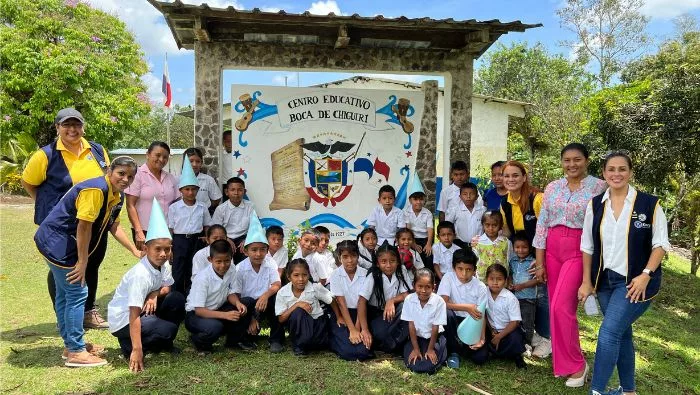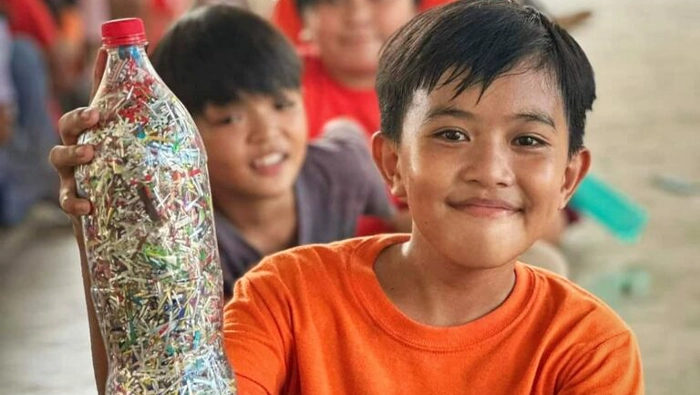
Club grants span continents
Kiwanis Children’s Fund grants help clubs start projects that support kids’ health and education.
By Erin Chandler
This March, the Kiwanis Children’s Fund awarded club grants to 12 outstanding Kiwanis club projects that are making a difference across four continents. The following projects highlight the truly international spirit of Kiwanis and show how Kiwanians have addressed the specific health and education needs of kids in Italy, Panama, Austria, Nepal and the United States.
Bright futures start with a diagnosis
Kiwanis Club of Lalbandi, Kathmandu, Nepal
According to a survey conducted by the Kiwanis Club of Lalbandi, four to five cases of autism spectrum disorder are being diagnosed each day in one Kathmandu health clinic alone. Some children stop attending school as a result. Seeing the clear need in its community, the club is partnering with local autism centers to support kids dealing with this often-misunderstood condition. Club members will receive training to help screen for autism spectrum disorder and assist at therapy centers that provide speech-language, play-based, physical, occupational and nutritional therapies. A grant from the Kiwanis Children’s Fund will help purchase medications and food supplements for those who can’t afford them, as well as software to track patients’ progress.
A new dining room for a healthy start
Kiwanis Club of Libertad, Coclé, Panama
The Kiwanis Club of Libertad will use a Kiwanis Children’s Fund grant to purchase tables, chairs, eating and kitchen utensils, a refrigerator, an industrial sink, paint and food for the remodeled dining room at Boca de Chiguirí Primary School. Children in the area suffer from food insecurity and often come to school without receiving meals at home. The club is partnering with various government ministries, local companies and others to create a self-sustaining nutrition program that will include vegetable gardens and poultry farming at the school. Once the dining room is structurally safe and furnished, students, parents and teachers will collaborate to bring the program to life.
Children’s gardens for kindergartens
Kiwanis Club of Mühlviertel, Schwertberg, Austria
The word “kindergarten” means “children garden” — and the Kiwanis Club of Mühlviertel is taking it literally, installing raised-bed gardens at 19 kindergartens in the Perg district of Austria. A Kiwanis Children’s Fund grant will help cover the cost of the aluminum beds. Once the gardens are installed, the “little researchers” will learn how vegetables grow and thrive, how insects pollinate flowers and how fruits and blossoms form — and they will develop a sense of responsibility from caring for the garden.
A soft room in a safe house
Kiwanis Club of Gallarte, Varese, Italy
A Kiwanis Children’s Fund club grant will help the Kiwanis Club of Gallarte build a Montessori room for children ages six and under living in “protected houses” after leaving dangerous home environments. These children often arrive experiencing severe physical and emotional complications. The room will be painted in “soft colors” to promote tranquility and filled with child-size furnishings, sensory panels, carpets, games, “work” surfaces and more. The club hopes this room will help develop the children’s creativity, intelligence and sensory awareness, setting them on a path for healthy growth.
Reading in the rain
Kiwanis Club of Malden, Massachusetts, U.S.
Since 2016, the Kiwanis Club of Malden has provided free books to hundreds of local children at its Bubbles and Books event. (It also features a bubble magician for extra fun.) A puppeteer storyteller even takes part to enhance a love of literacy for all kids in this very diverse community, where over 50 languages are spoken in the public schools. Recently, however, the club has had to cancel or reschedule Bubbles and Books due to rain or extreme heat. A Kiwanis Children’s Fund grant will help the club purchase tents for shade and shelter, so kids can choose new books to take home in rain or shine.
More books, playgrounds and essential supplies
Other projects that received club grants in March include:
- Book giveaways from the Kiwanis clubs of Pawleys Island, South Carolina, U.S.; Cicero, Indiana, U.S.; and Literacy in Salinas CA, California, U.S.
- A book vending machine from the Kiwanis Club of Lincoln, California, U.S.
- Inclusive playgrounds from the Kiwanis clubs of Portsmouth, Ohio, U.S. and Phoenix, Arizona, U.S.
- A supply closet for students in need from the Kiwanis Club of Olmsted Falls, Ohio, U.S.
Apply for a club grant
The upcoming deadline to complete the first application step for a Kiwanis Children’s Fund club grant has been extended to April 15, 2024! Learn how your club can apply for a grant to help kids in your community. If you have any questions, contact grants@kiwanis.org.
How you can help
The Kiwanis Children’s Fund makes grants that improve the lives of children around the world by identifying projects that create a continuum of impact in a child’s life — one that spans their entire childhood and sets them up for a bright future. By funding projects that target the Kiwanis causes — health and nutrition, education and literacy, and youth leadership development — whether through a Kiwanis club’s local service project or a club’s partner, the Children’s Fund ensures that its grantmaking has the greatest possible impact.
If you are interested in extending your and your club’s impact beyond your community, make a gift to the Children’s Fund.


